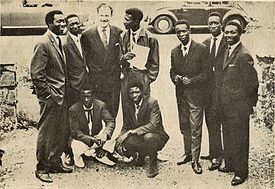Le Grand Kallé et l'African Jazz
Le Grand Kallé et l'African Jazz | |
|---|---|
 African Jazz members with a man in 1961 | |
| Background information | |
| Also known as | African Jazz |
| Origin | Belgian Congo (Léopoldville) (modern-day Democratic Republic of Congo) |
| Genres | Congolese rumba |
| Years active | 1953–1963 1966–1968 |
Le Grand Kallé et l'African Jazz, often simply referred to as African Jazz, was a popular and extremely influential Congolese rumba band from the modern-day Democratic Republic of the Congo. Founded in 1953 in Léopoldville (modern-day Kinshasa) under Belgian colonial rule, the band was led by Joseph Kabasele Tshamala, popularly known by his stage name Le Grand Kallé. The group saw its heyday between 1958 and 1962, after which it was hit by defections by its members in 1963. It was briefly revived after 1966.
History
African Jazz emerged from the vibrant urban culture of Léopoldville during the last decade of Belgian rule in the Congo.[1] Its music, driven by members of the rising African middle class, became popular during the move towards independence as an expression of rising national self-confidence.[2] The new musical style, pioneered by the group, brought together foreign musical influences and western instruments with indigenous musical rhythms.[3] The band itself was created at the initiative of Joseph Kabasele Tshamala, known as Le Grand Kallé, in 1953.[4]
The band reached the apogee of its success between 1958 and 1962.[5] Travelling to Belgium in 1960 at the time of negotiations on the Congo's independence, African Jazz was one of the first groups to introduce African popular music into the European market.[4] The band produced the hit "Indépendance Cha Cha" soon afterwards, which is a mixture between Lingala language and French loanwoards, that helped it become a hit both in Congo and outside the country's borders.[2][4]
During its early development, African Jazz maintained a strong rivalry with Leopoldville's other major "rumba orchestra", OK Jazz, led by Franco Luambo Makiadi.[6] The rivalry manifested in a move towards different musical styles by both bands which would define the two schools of Congolese rumba that emerged in the period.[6] African Jazz played an important role in introducing new musicians to the Congolese public. These included Nico Kasanda (known as Docteur Nico) and Tabu Ley Rochereau, both of whom would become important rumba musicians in their own right after the mid-1960s.[6] Anthropologist Bob W. White has compared the "clean, cosmopolitan, modernist sound" of African Jazz by the mid-1960s with the "more rootsy traditionalist sound" of OK Jazz to illustrate the argument.[6]
In July 1963, the African Jazz split with all its musicians leaving to form a new group, African Fiesta, leaving Kallé as African Jazz's only member.[7] In 1966, Kallé reconstructed the band with a new group of musicians and embarked on an overseas tour, but the new group fell apart in 1967–68 with musicians leaving to form a new band.[7]
Personnel

- "Le Grand Kallé" (Joseph Kabasele) - vocals, bandleader
- Dr Nico Kasanda - lead guitar
- Manu Dibango - saxophone
- Franklin Boukaka - vocals
- Déchaud Mongala (Charles Mwamba) - guitar
- Sam Mangwana - vocals
- Tabu Ley Rochereau - vocals
- Youlou Mabiala - vocals
- Josky Kiambukuta - vocals
- Pierre Yantunla - drums
- Edouard Lutula - clarinet
- Kalé-Roger - percussion
- Pépé Kallé - vocals
- Suzy Kaseya - lead guitar
- Armando Brazzos - contrebassist
- "Vicky" Victor Longamba - vocals
Discography
- Singles
And dozens of others.[8]
- Contributing artist
See also
References
- ^ Wa Mukuna 1992, pp. 72–4.
- ^ a b White 2008, p. 243.
- ^ Wa Mukuna 1992, pp. 75–6.
- ^ a b c Onyumbe 1999, p. 326.
- ^ Onyumbe 1999, p. 328.
- ^ a b c d White 2008, p. 42.
- ^ a b Onyumbe 1999, p. 329.
- ^ "Grand Kalle And African Jazz". Discogs. Retrieved 29 August 2019.
Bibliography
- Onyumbe, Tshonga (1999). "KALLE Jeef Ou Joseph Kabasele Tshamala. Biographie et œuvre d'un chanteur congolais". Annales Aequatoria. 20: 323–53. JSTOR 25836656.
- Wa Mukuna, Kazadi (1992). "The Genesis of Urban Music in Zaïre". African Music. 7 (2): 72–84. doi:10.21504/amj.v7i2.1945. JSTOR 30249807.
- White, Bob W. (2008). Rumba Rules: The Politics of Dance Music in Mobutu's Zaire. Durham: Duke University Press. ISBN 9780822341123.
